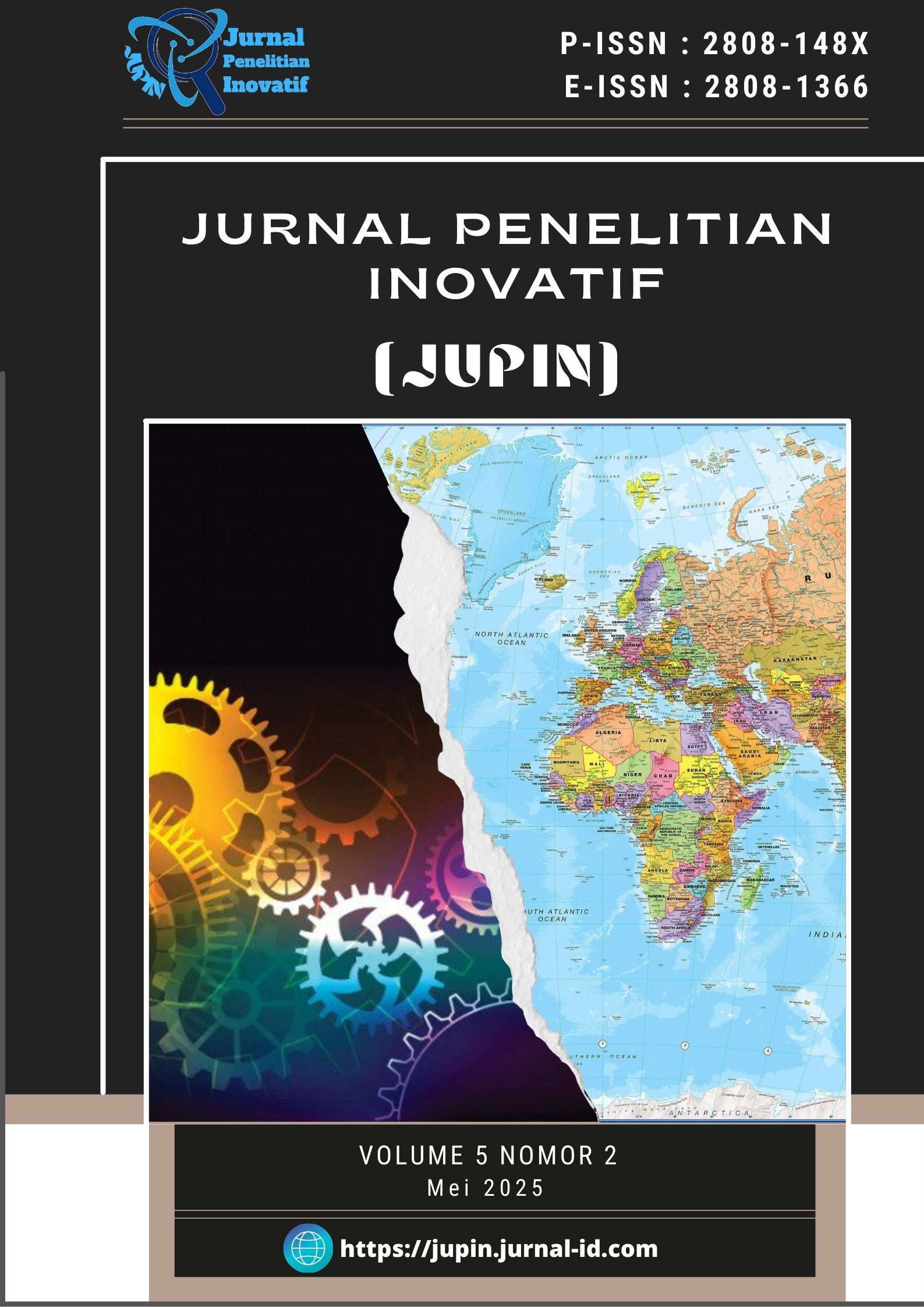Pengaruh Adiksi Media Sosial terhadap Tingkat Depresi pada Mahasiswa: Studi Kuantitatif di Universitas Padjadjaran
DOI:
https://doi.org/10.54082/jupin.1366Kata Kunci:
Adiksi Media Sosial, Depresi, Kesehatan Mental, Mahasiswa, Media SosialAbstrak
Meningkatnya penggunaan media sosial, yang dapat menimbulkan adiksi dan berdampak buruk pada kesehatan mental, khususnya depresi, pada mahasiswa Universitas Padjadjaran, adalah subjek penelitian ini. Tujuan utama penelitian adalah untuk melihat bagaimana adiksi media sosial berdampak pada tingkat depresi populasi. Penelitian menggunakan metode kuantitatif, menggunakan instrumen Internet Addiction Test (IAT) untuk mengukur tingkat adiksi media sosial dan Skala Depresi Pusat Studi Epidemiologi (CES-D). Data diuji dengan regresi linier. Hasilnya menunjukkan koefisien regresi sebesar 0,835 dan nilai Beta sebesar 0,755 (p < 0,001), yang menunjukkan bahwa ada pengaruh signifikan antara adiksi media sosial dan depresi. Selain itu, ada korelasi positif Pearson sebesar 0,755. Hasil ini mendukung bukti sebelumnya bahwa adiksi media sosial berkorelasi langsung dengan depresi mahasiswa. Penelitian ini menunjukkan bahwa penggunaan media sosial di institusi pendidikan tinggi harus diperhatikan. Strategi literasi digital dan metode penggunaan media sosial yang sehat dapat dipertimbangkan untuk mengurangi depresi yang terkait dengan adiksi media sosial.
Referensi
Andreassen, C. S., Pallesen, S., & Griffiths, M. D. (2017). The relationship between addictive use of social media, narcissism, and self-esteem: Findings from a large national survey. Addictive `Be-haviors, 64, 287–293. https://doi.org/10.1016/j.addbeh.2016.03.006
Aichner, T., Grunfelder, M., Maurer, O., & Deni Jegeni. (2021). Twenty-Five Years of Social Media : A Review of Social Media Applicationsand Definitions from 1994 to 2019. Cyberpsychology, Be-havior, and Social Networking, 24(4). https://doi.org/10.1089/cyber.2020.0134
Arias-de la Torre, J., Puigdomenech, E., García, X., Valderas, J. M., Eiroa-Orosa, F. J., Fernández Vil-la, T., ... & Espallargues, M. (2020). Relationship between depression and the use of mobile tech-nologies and social media among adolescents: umbrella review. Journal of medical Internet re-search, 22(8), e16388.
Bansal, D. (2023). Social Media and Depression - A Review. International Journal For Multidiscipli-nary Research.
Cheng, C., Lau, Y., Chan, L., & Luk, J. W. (2021). Prevalence of social media addiction across 32 na-tions: Meta-analysis with subgroup analysis of classification schemes and cultural values. Addic-tive Behaviors, 117. https://doi.org/10.1016/j.addbeh.2021.106845
Critchfield, N. J. (2020). The Impact of Social Media on Adolescent Mental Health.
Cunningham, S., Hudson, C. C., & Harkness, K. (2021). Social Media and Depression
Symptoms: a Meta‑Analysis. Research on Child and Adolescent Psychopathology, 49. https://doi.org/10.1007/s10802-020-00715-7
Ghaemi, S. N. (2020). Digital depression: a new disease of the millennium?. Acta Psychiatrica Scandi-navica, 141(4), 356-361.
Griffiths, M. (2005). A ‘components’ model of addiction within a biopsychosocial framework. Journal of Substance Use, 10(4), 191–197. https://doi.org/10.1080/14659890500114359
Haand, R., & Shuwang, Z. (2020). The relationship between social media addiction and depression: a quantitative study among university students in Khost, Afghanistan. International Journal of Ado-lescence and Youth, 25(1). https://doi.org/10.1080/02673843.2020.1741407
Hruska, J., & Maresova, P. (2020). Use of Social Media Platforms among Adults in the United States—Behavior on Social Media. societies, 25(1).
Hussain, Z., & Griffiths, M. D. (2019). The Associations between Problematic Social Networking Site Use and Sleep Quality, Attention-Deficit Hyperactivity Disorder, Depression, Anxiety and Stress. International Journal of Mental Health and Addiction, 19. https://doi.org/10.1007/s11469-019-00175-1
Izam, N. A. A. M., & Khaiyom, J. H. A. (2019). A Review on the Relationship between Social Media Usage, Social Media Sharing, and Depressive Symptoms among University Students. Jurnal Psikologi Malaysia, 33(2).
Kalra, M., Kaur, B., Kaur, G., & Vashisth, A. (2019). Correlation of Social Media Usage With Depres-sion: A Systematic Review. Think India Journal, 22(16), 2280-2293.
Keles, B., McCrae, N., & Grealish, A. (2020). A systematic review: the influence of social media on depression, anxiety and psychological distress in adolescents. International Journal of Adoles-cence and Youth, 25(1). https://doi.org/10.1080/02673843.2019.1590851
Orben, A. (2020). Teenagers, screens and social media: a narrative review of reviews and key studies. Social psychiatry and psychiatric epidemiology, 55(4), 407-414.
Parent, M. C., Gobble, T. D., & Rochlen, A. (2019). Social media behavior, toxic masculinity, and de-pression. Psychology of Men & Masculinities, 20(3), 277.
Ponnusamy, S., Iranmanesh, M., Foroughi, B., & Hyun, S. S. (2020). Drivers and outcomes of Insta-gram addiction: Psychological well-being as moderator. Computers in Human Behavior, 107, Ar-ticle 106294. https://doi.org/10.1016/j.chb.2020.106294
Radloff, L. S. (1991). The use of the Center for Epidemiologic Studies Depression Scale in adolescents and young adults. Journal of Youth and Adolescence, 20.
Schønning, V., Hjetland, G. J., Aarø, L. E., & Skogen, J. C. (2020). Social media use and mental health and well-being among adolescents–a scoping review. Frontiers in psychology, 11, 1949.
Shensa, A., Escobar-Viera, C. G., Sidani, J. E., Bowman, N. D., Marshal, M. P., & Primack, B. A. (2017). Problematic social media use and depressive symptoms among US young adults: A na-tionally-representative study. Social science & medicine, 182, 150-157.
Stieglitz, S.; Mirbabaie, M.; Ross, B.; Neuberger, C. Social media analytics–Challenges in topic dis-covery, data collection, and data preparation. Int. J. Inf. Manag. 2018, 39, 156–168.
Sun, Y., & Zhang, Y. (2021). A review of theories and models applied in studies of social media addic-tion and implications for future research. Addictive Behaviors, 114. https://doi.org/10.1016/j.addbeh.2020.106699
Wallace, M. G. (2020). # Depressed: A Critical Literature Review Exploring Social Media and Its Ef-fect on the Psychological Well-being of Adolescents and Young. Azusa Pacific University.
WHO. (2020). Depression,p.1. https://www.who.int/news-room/fact-sheets/detail/depression Young, K. S. (2016). Internet Addiction Test (IAT). Stoelting Company.
Zhu, W., Mou, J., Benyoucef, M., Kim, J., Hong, T., & Chen, S. (2020). Understanding the relation-ship between social media use and depression: a review of the literature. Online information re-view, 47(6), 1009-1035.
Unduhan
Diterbitkan
Cara Mengutip
Terbitan
Bagian
Lisensi
Hak Cipta (c) 2025 Muhammadafi Mulantara, Kunto Adi Wibowo, Ikhsan Fuady

Artikel ini berlisensi Creative Commons Attribution 4.0 International License.


















